Floor Screeding Amesbury Wiltshire (SP4): If you have a damaged or uneven floor, are renovating a property or cellar or are planning to install under floor heating, then making contact with a professional floor screeding company in Amesbury is the best solution. To provide a level foundation for you final flooring material, a screed is used to generate a smooth floor surface over a concrete sub-base. If you want your floors to last a long time then floor screeding is one of the most important factors in any renovation or building task.
FLOOR SCREEDING CONTRACTORS AMESBURY
Whatever shape or size of room or area you're remodeling, a floor screeding company in Amesbury will supply the expertise and proper working practices to establish the perfect base for your floor. After a diligent evaluation of your flooring project, they will be in a position to inform you about which method of laying is most effective for your circumstances, and which is the perfect kind of screed.
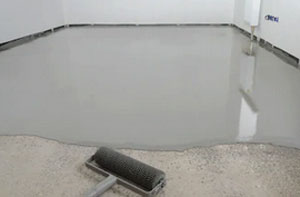
It may be a requirement, according to the proposed use of the room, for a survey by a structural engineer to abide by building regulations on flex strength, point loadings and load bearing of the screed floor.
Working with a skilled and highly trained contractor will guarantee that you use the appropriate form of screed for the room's anticipated purpose to extend the lifespan of your flooring. Picking the correct screeding materials and the best installation technique is crucial if you want a durable and quality finish for your floor surface.
Before choosing a floor screeding company from any based in the Amesbury area, ask to what standard of finish they are basing their price quote, and also make certain you get multiple price quotes. The Surface Regularity (SR) finish is the number to look for when studying a quote from your Amesbury screeding contractor. SR2 and SR3 may be less expensive options, but the finished floor surface may have deviations and errors, whilst SR1 guarantees a pretty much perfect quality of finish. This could mean that you may need to fix any areas that might cause problems when putting down your final flooring material.
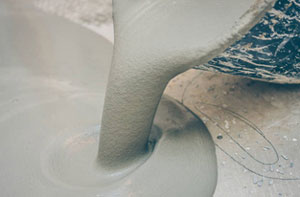
The rules and regulations laid down in the British Standards BS8204 have to be followed by all Amesbury floor screeding companies and they should also hold accreditation with the manufacturers of specialist screeding materials (Flowcrete, Cemfloor, Gypsol etc.) to verify their competence and safe working practices. A company holding accreditations indicates they have been assessed and trained in using these products and can provide a top notch service in all aspects of their installation.
For the screeding of floors in shops, factories, hospitals, schools, pubs and warehouses, dedicated Amesbury commercial screeders will be needed.
TYPES OF SCREED
Standard Screeds - This is perfect for everyday domestic use and is a mix of sand and cement. 5 parts sand to 1 part cement is the usual mix for standard screeds. The standard screed dries at a rate of 1mm thickness each day.
Fast Drying and Advanced Drying Screeds - As the name would suggest, this screed dries rapidly and allows you to use the floor area much faster. Drying at a rate of 3-7mm/day, depending on the specialised mix, they are normally a fibre reinforced type of screed and are suitable for projects that have tight deadlines.
Liquid or Self-Levelling Screeds - A latex and cement solution which can achieve the highest standard of finish to SR1 levels. Mostly used to finalise a damaged floor or poor substrate level to enable the laying of a new flooring surface, like tiles on top of it. Even with a thickness of only 1mm, the latex polymers within the screed provide a high strength surface for a wide range of uses.
Polymer Screeds - A high strength flooring solution where a reduced screed thickness is needed. Because of their different chemical compositions, polymer screeds have varying curing times which you can verify by studying manufacturer's guidelines.
Industrial and Heavy Duty Screed - A screed that's designed for high load and heavy traffic areas where maximum durability and strength is crucial.
Fibre Reinforced Screed - The professional's choice for residential use on top of under floor heating. The special fibres in the screed improve overall durability and strength while also protecting against thermal shrinkage and cracking. The screed will set hard at a rate of roughly 1mm/day.
SCREEDING PREPARATION AND INSTALLATION
To enable the screeding to be of a high quality finish which is durable and hard wearing, time should be spent on carefully preparing the area before any screeding material is poured. It is vital that any contaminants such as oil, paint, grease or debris is eradicated from the floor surface before laying any screed, because these can affect the bonding capability that a quality floor screed requires.
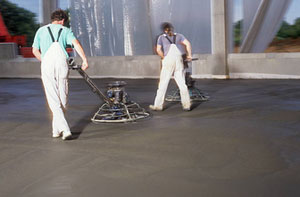
If any cleaning products were used during this stage it's vital to make certain that no residues of soaps or other cleaning products are left on the floor surface and it's permitted to dry out naturally. At this point any cracks should be repaired as these can easily travel up through the laid screed and be reflected in the completed floor surface. During a site survey your Amesbury screeding installer will notice what preparation work is required before starting to work on screeding the floor.
A DPM (damp proof membrane) will be applied once the preparation work has been completed to stop ground dampness getting into the screeding and floor materials. Different thicknesses of specialised polythene might be used as a damp proof membrane and also serve as a buffer for the screed and any insulation panels.
If the area is at risk from radon then a further barrier is essential to stop the gas from entering via the ground. If radon is present in severe doses then a complete extraction and ventilation system might be needed underneath the layer of screed which will extract any gases that could seep in from ground level.
The final step of the surface preparation process is the painting or spraying of a sealant or primer. A primer helps with the screed bonding correctly to the base and membranes and different varieties exist based on which type of screed is being used. Equipment such as airless sprays can be used to apply a sealant or primer, by professional screeding companies in Amesbury following the manufacturer's guidelines and safety advice.
Before any screed can be laid, any underfloor heating will now be laid out. Insulation panels can be laid out and the heating pipes and cables will be firmly attached so there's no movement whilst the screed is being poured. When professionally installed an underfloor heating system is an excellent way to warm up a room and top quality screed will retain its heat, generating an even level of warmth right across the floor surface.
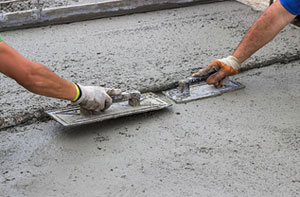
Of course, if you are not installing under floor heating, you can just ignore this stage and apply the screeding. The particular requirements of the room will dictate the sort of screeding used. After the pouring of the screed there'll be at least twenty four hours (for quick drying screeds) before you can walk upon the surface, and a 72 hrs minimum setting period before any floor covering installations. If you're using heavy duty or standard screeds the drying time is increased and the manufacturer's guidelines must be followed so as to get the best possible finish to your floor.
The SR level of your screed can be checked once it has set enough to be walked on. The basic SR test involves the use of a 2m long straight-edge to check for any fluctuations in the screeded surface.
- SR1 - Disparities of 3mm or less as measured over the whole floor area shows your screeding to be of the best quality and classed as SR1.
- SR2 - SR2 is for normal standard floors in commercial and industrial projects and can deviate from the straight-edge by as much as 5 millimetres.
- SR3 - For a utility area or room where the finish is relatively inconsequential SR3 is the standard and should have a deviation measurement of 10mm or less.
If your screeding has been laid with particular loading in mind then a qualified structural engineer is going to be necessary to carry out these soundness tests. The testing will ensure your newly laid screeded surface is viable for the load bearing requirements set down in the original site survey. A drop hammer test will be performed on different areas of the screed and the outcomes documented. Any screed flooring that's got point load requirements must be sanctioned by a trained structural engineer heeding the BS8204 guidelines. (Tags: Floor Screed Amesbury, Floor Screeding Amesbury, Screeding Amesbury, Floor Screeding Services Amesbury).
Screeding services are available in Amesbury and also in: Salterton, Netton, Bulford, Figheldean, Newton Tony, Ratfyn, Great Durnford, Upper Woodford, Porton, Rollestone, Countess, Salisbury, Larkhill, Durrington, South Newton, Idmiston, and in these postcodes SP4 7GP, SP4 7HW, SP4 7HP, SP4 7AT, SP4 7FR, SP4 7AL, SP4, SP4 7NT, SP3 4WX, and SP4 7JA. Locally based Amesbury floor screeders will probably have the postcode SP4 and the dialling code 01980. Verifying this will confirm that you access locally based floor screeding. Amesbury householders are able to utilise these and lots of other similar services. Homeowners who require floor screeding quotations can just click on the "Quote" banner.
Screed Reinforcement
Screed reinforcement is a technique for reinforcing concrete screeds to improve their durability and strength. Screeds are created by applying flat and thin layers of concrete to a base layer, resulting in a level surface. Commonly, they are used in building projects as flooring, but they can also function as a finishing layer for walls and ceilings.
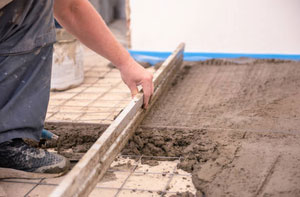
Embedding reinforcement materials, like steel mesh, fibres or wire, into the screed mixture during installation is done to increase strength and prevent cracking. The reinforcement of the surface evens out the distribution of load and weight while also increasing its resistance to thermal changes, impact and abrasion.
In addition to improving the screed's strength and durability, reinforcement also helps to reduce the risk of shrinkage and cracking caused by changes in humidity or temperature. Factors such as finish, thickness and load capacity play a role in the selection of reinforcement material for a project, which can vary according to precise requirements. To ensure that their projects will provide a functional, high-quality surface for many years to come, professional screeders may use screed reinforcement.
Screed Floor Sealing Amesbury
The durability of screed floors is protected and enhanced through the vital process of sealing, which is usually carried out by professional screeders. Screed, composed of sand and cement, provides a level, smooth surface perfect for flooring. To maintain its appearance and integrity, however, sealing is required. To provide a protective barrier against wear, stains and moisture, a professional will apply a good quality sealant that penetrates the screed.
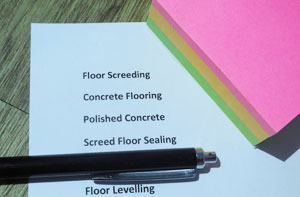
The procedure of sealing starts with a comprehensive cleaning of the screed floor to clear away any dirt, dust or debris. An even coat of sealant is applied to the floor surface, once it is dry and clean. This action ensures all areas are covered by the sealant, filling any tiny pores or cracks. In order to form a long-lasting and durable protective layer, the sealant usually needs time to dry and completely cure.
Having a professional seal your screed floor not only extends its lifespan but also enhances its appearance. The sealing process gives the floor a polished, smooth finish that is easier to clean and maintain. Preventing damage from heavy footfall and spillages, it also makes a sound investment for both residential and commercial properties in Amesbury. (Screed Floor Sealing Amesbury)
Screed Floor Removal
Removing a screed floor necessitates the extraction and disposal of the pre-existing screed from the surface. The necessity often arises when upgrading or refurbishing a floor. Specialist techniques and equipment are employed in the removal process to break up and remove the screed layer in an effective manner. The surface can be prepared for new flooring or other alterations, thanks to this. With expertise in screed removal, contractors proficiently and safely remove the old screed, offering the floor a renewed opportunity for design alterations, upgrades or repairs. (91044 - Screed Removal Amesbury)
Floor Screeding Near Amesbury
Also find: Ratfyn floor screeding, Great Durnford floor screeding, Netton floor screeding, Rollestone floor screeding, Figheldean floor screeding, Upper Woodford floor screeding, Idmiston floor screeding, Newton Tony floor screeding, South Newton floor screeding, Salisbury floor screeding, Durrington floor screeding, Salterton floor screeding, Larkhill floor screeding, Bulford floor screeding, Porton floor screeding, Countess floor screeding and more. Contractors who do screeding can be found in almost all of these towns and areas. For delivering top-quality flooring solutions, these experienced specialists have the expertise and skills required. For both commercial and domestic properties, they are skilled in screeding and make sure that the work is executed to the highest possible standards. By clicking here, local residents can get screeding price quotes.

Other Trades Amesbury: Not surprisingly, when you happen to be doing home renovations in Amesbury, you will probably be in need of all sorts of different tradesmen and as well as floor screeding in Amesbury, you may additionally need home improvements in Amesbury, floor tiling in Amesbury, an underfloor heating specialist in Amesbury, vinyl flooring in Amesbury, an electrician in Amesbury, solar panel installation in Amesbury, garden clearance in Amesbury, patio cleaning in Amesbury, a handyman in Amesbury, a carpenter/joiner in Amesbury, a plumber in Amesbury, a plasterer in Amesbury, a carpet layer in Amesbury, and other different Amesbury tradesmen. To make enquiries and get quotations, just click on the highlighted links.
Amesbury Screeding Related Tasks

There are a number of different tasks that can be undertaken by your local Amesbury floor screeding specialist including floor screed testing, floating screed, underfloor heating screeding, flow screeding in Amesbury, unbonded screed, screeded kitchen floors, floor noise dampening in Amesbury, floor repairs, floor screed repairs, pumped screed installation, floor levelling, decorative floor screeding, thin bed floor screeding, floor screeding tools, floor insulation in Amesbury, anhydrite floor screeding, screeding advice, acoustic flooring, concrete screeds, bathroom floors, monolithic screeding, subfloor repair, floor screeding quotes, fibre reinforced floor screeding, residential floor screeding, underfloor heating installations, screed testing, lightweight screeding, waterproof screeding, polished screeding, and lots more floor screeding tasks. Listed are just a selection of the duties that are handled by people specialising in screeding. Amesbury providers will inform you of their whole range of screeding services.
More: Residential Screeding, Flooring Contractors, Screed Flooring, Floor Screeders, Cheap Floor Screeding, Flooring Contractors, Screed Flooring, Screeding Services, Flooring Contractors, Screeding, Flooring Contractors, Floor Screeders, Floor Levelling Services, Screeding Specialists, Flooring Contractors, Screeding Companies, Coloured Screeding, Cheap Screeding, Screeding Contractors, Screed Flooring, Floor Screeders, Polished Screeding, Cheap Screeding, Decorative Screeding, Polished Screeding, Floor Levelling, Decorative Screeding, Cheap Floor Screeding, Cheap Screeding, Screeding Companies, Self-Levelling Screeds, Floor Screeding, Self-Levelling Screeds, Coloured Screeding, Cheap Driveways, Concrete Driveway Builders, Driveway Installers.
TOP - Floor Screeding Amesbury
Floor Screeding Companies Amesbury - Floor Levelling Services Amesbury - Screeding Services Amesbury - Floor Screed Companies Amesbury - Fast-Dry Screeding Amesbury - Commercial Screeding Amesbury - Floor Screeding Estimates Amesbury - Self-Levelling Screed Specialists Amesbury - Screeders Amesbury


